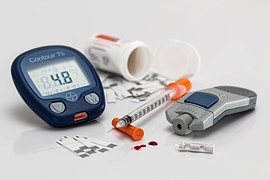New research has shown that a radical diet shift can actually send Type 2 diabetes into remission, something thought impossible until now. Even people who have had the disease for years have been able to reverse the  disease and stay diabetes free after they go back to normal eating. Participants in the study were put on a low calorie liquid diet for 8 weeks, then returned to normal eating after the 8 weeks were up. The diet change is thought to work due to the low calorie intake. The body is able to use up all the fat in the pancreas and liver, allowing normal insulin function to return to the pancreas. Nearly half of the participants had a remission that lasted at least six months. The big question here is how long will the effects of the diet change last? Scientists will continue to study the outcomes and hope to see good news for diabetics.
disease and stay diabetes free after they go back to normal eating. Participants in the study were put on a low calorie liquid diet for 8 weeks, then returned to normal eating after the 8 weeks were up. The diet change is thought to work due to the low calorie intake. The body is able to use up all the fat in the pancreas and liver, allowing normal insulin function to return to the pancreas. Nearly half of the participants had a remission that lasted at least six months. The big question here is how long will the effects of the diet change last? Scientists will continue to study the outcomes and hope to see good news for diabetics.
Vermont Asks Court to Release GMO Safety Data
 The Grocery Manufacturers Association (GMA) has challenged the legality of Vermont’s labeling law, and Vermont in turn is using this lawsuit to gain access to internal documents of GMO safety from large companies like Monsanto and DuPont. The GMA has said that there are no safety issues with GMOs, so Vermont’s lawyers have asked them to back up that statement with documents and data. Vermont’s lawyers also requested studies related to pesticides and herbicides that are used to treat GMO crops. None of the companies targeted would discuss the issue on tape, and have raised objections to the requests. This could be a very exciting turn in the fight against GMOs – we’re keeping an eye out for news about the court’s decision on the documents!
The Grocery Manufacturers Association (GMA) has challenged the legality of Vermont’s labeling law, and Vermont in turn is using this lawsuit to gain access to internal documents of GMO safety from large companies like Monsanto and DuPont. The GMA has said that there are no safety issues with GMOs, so Vermont’s lawyers have asked them to back up that statement with documents and data. Vermont’s lawyers also requested studies related to pesticides and herbicides that are used to treat GMO crops. None of the companies targeted would discuss the issue on tape, and have raised objections to the requests. This could be a very exciting turn in the fight against GMOs – we’re keeping an eye out for news about the court’s decision on the documents!
As Tuition Climbs, Hundreds of Food Banks Open on College Campuses
 In the past decade, college tuition has risen at least 40%, up to 95% in some states like Texas, leaving college students stuck with the hard choice of paying their tuition bill or buying food for themselves. Hundreds of college campuses nationwide have added food pantries to their campus in response the need for food security of their low and middle income students. The cost of the food banks doesn’t increase tuition, making it a rare free benefit. This is because the pantries are generally donation based and are often partnered with local food banks and organizations. It is a sad statement that students have to choose between bills and feeding themselves, and this issue should be brought to the nation’s attention. This issue could be partnered with the national food waste problem that we’ve frequently written about, and solve two problems at once. What do you think?
In the past decade, college tuition has risen at least 40%, up to 95% in some states like Texas, leaving college students stuck with the hard choice of paying their tuition bill or buying food for themselves. Hundreds of college campuses nationwide have added food pantries to their campus in response the need for food security of their low and middle income students. The cost of the food banks doesn’t increase tuition, making it a rare free benefit. This is because the pantries are generally donation based and are often partnered with local food banks and organizations. It is a sad statement that students have to choose between bills and feeding themselves, and this issue should be brought to the nation’s attention. This issue could be partnered with the national food waste problem that we’ve frequently written about, and solve two problems at once. What do you think?

Comments are closed.